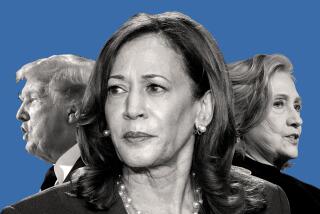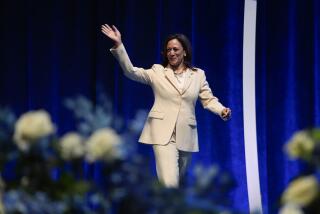Governor Seeks $1 Minimum Wage Hike
California’s minimum-wage workers would get a $1 raise to $7.75 an hour under a plan announced Thursday by Gov. Arnold Schwarzenegger, potentially bypassing Democrats who are pushing for a more generous proposal.
The Republican governor wants the Industrial Welfare Commission -- an obscure and dormant state board -- to increase the minimum wage on its own. As allowed by law, the five-member commission has increased the basic wage several times, most recently in 2001.
“The economy is strengthening, and we must take this important step to helping working families keep up,” Schwarzenegger said in a statement.
The move gives the governor an avenue to increase the minimum wage if negotiations fail over legislation being pushed by Democrats, who control the Legislature and are pressing for a $1-an-hour increase coupled with automatic annual raises tied to the inflation rate. Schwarzenegger has vetoed two previous efforts to raise the minimum wage, including a bill last year that included inflation indexing.
Assembly Speaker Fabian Nunez (D-Los Angeles) said he hoped an agreement could be reached that found a middle ground between Schwarzenegger’s plan and the Democrats’ legislation. The governor, he said, “has been sounding more and more like a Democrat. I would like to take advantage of that to help poor people for once.”
Labor groups said Schwarzenegger, during an election year, was attempting to soften criticism for opposing the Democrats’ proposal.
“Basically it’s an election-year stunt, because he’s afraid the Legislature is going to send him a bill and he’s going to have to sign it,” said Barry Broad, a lobbyist with the International Brotherhood of Teamsters union. “The governor wants as low a minimum wage increase as he can get away with.”
The Industrial Welfare Commission, denied a staff and budget by the Legislature, would be revived using funds from the state Labor and Workforce Development Agency, Schwarzenegger spokesman Darrel Ng said.
Bill Dombrowski, president of the California Retailers Assn. and chairman of the Industrial Welfare Commission, said he expected to get up and running fairly quickly using funding from the commission’s parent agency.
He said the commission could act in as little as 90 days, the time it took to raise the minimum wage to $6.75 from $6.25 an hour in 2001.
“I expect there will be three votes” to approve the increase, Dombrowski said.
The retailers association supports the $1 increase, the California Restaurant Assn. opposes any pay hike, and the California Chamber of Commerce has not taken a position.
The governor’s plan calls for two 50-cent increases over a nine-month period. He told the commission that the minimum wage should “set a reasonable floor for entry-level wages” so that jobs remain plentiful and workers are not laid off. He said the $1 raise would accomplish that task.
The commission by law has 120 days to begin considering the minimum wage issue. It must then hold public hearings around the state.
California’s current minimum wage is eighth highest in the nation. The federal minimum wage is $5.15 an hour.
An estimated 1.4 million workers in the state receive the minimum wage or slightly more as their base salary -- about $14,000 a year for someone working full time. A $1 increase would boost that to $16,000.
The Democrats’ plan calls for indexing, raising the basic wage automatically each year using inflation indicators such as the consumer price index. Indexing could become more controversial if inflation continues to heat up. Nationally, consumer prices have risen at an annual rate of 5.1% this year, the Labor Department said Wednesday, well ahead of last year’s 3.4%.
But the California Budget Project, a nonprofit group that studies government policies affecting the poor, said indexing would result in modest changes that would not put an undue burden on businesses.
Jean Ross, the group’s executive director, said indexing would provide businesses with “predictable increases rather than large increases followed by nothing for a number of years and then another sizable increase.”
Washington, Florida and Oregon adjust their minimum wages based on inflation and Vermont is set to begin the practice in 2007. California law allows cities to set their own minimum wages. San Francisco -- one of the most expensive places to live in the country -- has an $8.82-an-hour minimum wage and indexes every year.
“The good thing about indexing is once it’s in place, you don’t have to revisit the issue time and time again,” Nunez said. “Not only does it take politics out of it, but it also brings certainty to the lives of the poor.”
More to Read
Get the L.A. Times Politics newsletter
Deeply reported insights into legislation, politics and policy from Sacramento, Washington and beyond. In your inbox three times per week.
You may occasionally receive promotional content from the Los Angeles Times.







